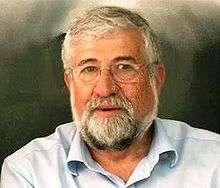Amram Mitzna
| Amram Mitzna | |
|---|---|
 | |
| Date of birth | 20 February 1945 |
| Place of birth | Dovrat, Mandatory Palestine |
| Knessets | 16, 19 |
| Faction represented in Knesset | |
| 2003–2005 | Labor Party |
| 2013–2015 | Hatnuah |
| Other roles | |
| 1993–2003 | Mayor of Haifa |
| 2003 | Leader of the Opposition |
| 2005–2010 | Mayor of Yeruham |
Amram Mitzna (Hebrew: עמרם מצנע, born 20 February 1945) is an Israeli politician and former general in the IDF. He is a former mayor of Haifa (1993–2003) and Yeruham (2005–2010) and led the Labor Party from 2002 to 2003. In 2012 he joined Hatnuah.
Youth, studies and military service
He was born in Kibbutz Dovrat to Jewish refugees from Germany.[1] He attended a military boarding school in Haifa, graduating in 1963 and enlisting into the IDF the same year. He served in various positions in the IDF armored force, the Command and Staff College, and the Operations Division in the General Staff, receiving the Medal of Distinguished Service for his actions during the Six-Day War and the Yom Kippur War, both of which saw him wounded.
In 1977 he graduated from the University of Haifa with a degree in geography, before studying at the U.S. Army War College in Pennsylvania, finishing his course in 1979.
In 1986 he was promoted to major general, and assisted the Head of the Operations branch. In 1987 he became commander of the Central Command, and in 1989 completed the program for senior public figures at the Weatherhead Center for International Affairs at Harvard University.
In 1990 he became head of the IDF's planning branch, and gained an MA from Haifa University in political science. He retired from the IDF in 1993.
Political career
In the same year as finishing his military career, Mitzna was elected mayor of Haifa representing Labour, and re-elected in 1998. He won the Labour's leadership elections on 19 November 2002 with 54% of the vote. During campaigning for the 2003 elections, Mitzna proposed that Israel pursue further negotiations with the Palestinian Authority, but if they failed to yield a solution, that Israel withdraw from the Gaza Strip and most of the West Bank, and unilaterally set its final borders. His position was lambasted by Likud leader Ariel Sharon, though later partially implemented by him as the disengagement plan.
Mitzna oversaw Labour's second worst electoral performance in the 2003 elections, the party winning just 19 seats. He resigned as party leader shortly after, replaced by Shimon Peres.
In November 2005, the Internal Affairs Minister appointed Mitzna acting mayor of Yeruham, a town in the southern Negev region, after the elected mayor was forced to step aside, due to incompetence. Mitzna resigned from the Knesset to take up the role.
In April 2008 and June 2009, Mitzna signed letters of support for the recently created J Street American pro-peace lobby group.[2]
On 1 December 2012, Mitzna joined Tzipi Livni's new centrist party, Hatnuah.[3] He was elected to the Knesset in second place on the party's list in the 2013 elections.[4] On 24 December 2014 he announced he was retiring from politics and would not seek re-election in 2015, although he supported the Zionist Union, an alliance of Hatnuah and Labor that had been formed for the elections.[5]
References
- ↑ An unlikely dove The Guardian, 4 October 2002
- ↑ "Letter of support from prominent Israelis". Retrieved December 21, 2010.
- ↑ Amram Mitza joins Livni's new party Ynetnews, December 1, 2012
- ↑ Asher Schechter (March 3, 2013). "The would-be Israeli prime minister: Amram Mitzna's tragic mediocrity". Haaretz. Retrieved August 2, 2013.
- ↑ Livni's Hatnuah disintegrating as Mitzna quits, Sheetrit expected to follow Haaretz, 25 December 2014
External links
- Amram Mitzna on the Knesset website
- Amram Mitzna - Labor Haaretz
- Amram Mitzna Jewish Virtual Library
- Official website (Hebrew) Amram Mitzna
| Party political offices | ||
|---|---|---|
| Preceded by Benjamin Ben-Eliezer |
Leader of the Israeli Labour Party 2002–2003 |
Succeeded by Shimon Peres |
| Political offices | ||
| Preceded by Arie Gur'el |
Mayor of Haifa 1993–2003 |
Succeeded by Yona Yahav |